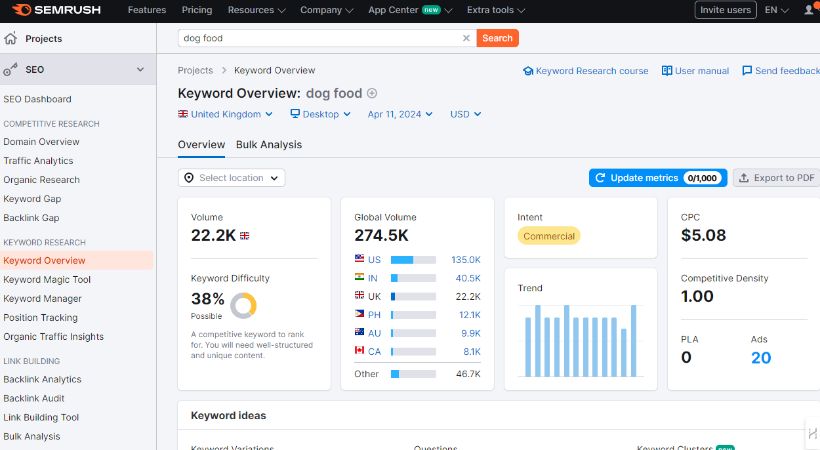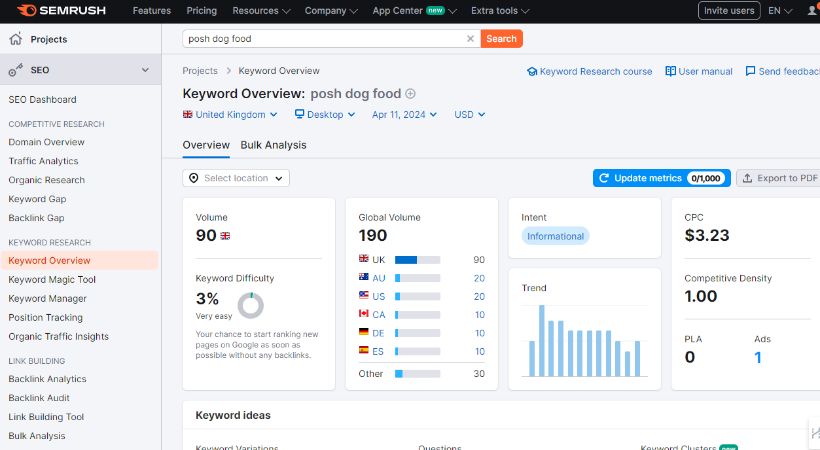Do you run a small business and wonder how the heck you climb the Google rankings faster than a McDonald’s drive thru?
Well luckily for you we’ve got a value packed article detailing 8 SEO tips you can use to help your small business climb the Google rankings.
We’re a marketing agency so we’ve helped many businesses with their SEO, including small businesses.
This has resulted in them not only climbing the rankings but staying there!
So without further ado, let’s get into it.

What is SEO and How Does it Work?
SEO (Search Engine Optimisation) is the practice of optimising a website to improve its visibility and ranking in search engine results pages (SERPs).
The goal of SEO is to grow your organic traffic to a website by increasing its relevance and authority concerning specific search queries.
Let’s look at an example.
Imagine you sell dog food.
When someone types a query relating to dog food into a search engine they will get a whole list of companies popping up in the search results.
If your site isn’t anywhere near the top, or at least on the first page then there is a slim chance someone will not click on your site.
Ideally, you want to be at the top of your customer’s search queries.
Because if you aren’t, you can bet your competitors are.
So the job of an SEO specialist is to ensure your site is ranking high on these search pages for relevant search queries made by your customers.
What is EEAT?
Yes, another acronym to remember.
Welcome to the world of digital marketing. The acronym capital of the world!
EEAT stands for Experience, Expertise, Authoritativeness, and Trustworthiness.
It’s a concept that originated from Google’s Search Quality Evaluator Guidelines, which are a set of guidelines used by human evaluators to assess the quality of search results.
It was originally just EAT until the additional E was added in late 2022 thanks to, in typical Google fashion, an update to their algorithm.
Here’s what each component of E-E-A-T represents:
- Experience: Google takes into account the writer’s firsthand or lived experience regarding the topic when assessing content.
- Expertise: It denotes the depth of knowledge and proficiency possessed by a content creator or website in a specific area or subject matter.
- Authoritativeness: This pertains to the level of esteem and credibility the content creator or website holds within its niche or industry.
- Trustworthiness: It encompasses the general reliability and honesty of the content creator or website, including factors such as transparency, precision, and ethical conduct.
8 SEO Tips for Small Businesses
1. Set Up Your Google Business Profile
A Google business profile is essential when it comes to SEO.
It’s a profile that you can set up on Google which helps users find and learn more about your business.
Optimising a Google Business Profile with relevant keywords, accurate business information, and high-quality images can positively impact your business’s search engine rankings.
This is especially true for local searches, where Google prioritises businesses with complete and optimised profiles.
2. Do Keyword Research
Keywords matter when it comes to SEO.
These keywords give you an insight into what terms your audience is searching for.
Knowing this is invaluable when it comes to climbing the search rankings and converting traffic into cash.
Let’s take a look at the dog food example again.
Dog food as a term on its own has quite a search volume. Dog food is a broad keyword and is going to be quite competitive.

But if you type in the term ‘Posh dog food’ you can see that the search volume is a lot lower. It will also be a lot less competitive to rank for this keyword.

This means you could create a blog post around posh dog food.
Allowing you an opportunity to compete for search traffic in this space.
As long as your content is relevant, valuable and useful to your audience then Google should rank it.
Now, don’t just create content around less competitive keywords and expect to rank number 1 on Google by the end of the week.
It doesn’t work like that!
But this is a great strategy to get you started and get some search traffic through the door.
3. Make Great Content
SEO and content go together like cheese on toast.
That’s why you need to make your content not just good, but great!
As a small business owner, you might fall into the trap of believing that your content can’t compete with larger businesses.
That’s simply not true.
Try to look at Google as the ultimate matchmaker. It wants to connect users with what they want.
So if your content is useful and of great value to users then Google will serve it up to them.
Bigger businesses will have an advantage in some aspects but by focusing on making your content as valuable and relevant as possible to your audience, you’ve got a shot!
So how do you write great content for small business SEO?
Here’s our top tips:
- Understand your local audience – Research your local community to understand their interests, needs, and preferences. Identify local events, landmarks, and issues that are relevant to your audience.
- Local keyword research – Use keyword research tools to find local keywords related to your business and location (e.g., “best coffee shop in [city],” “dog grooming services near [neighbourhood]”). Consider including location-specific terms such as city names, neighbourhoods, landmarks, and local slang in your keywords.
- Create location specific content – Develop content that addresses local topics, events, and news relevant to your audience. Write blog posts, articles, or guides that highlight local attractions, businesses, or activities. Share stories or testimonials from satisfied local customers to build trust and credibility.
- Provide local resources and guides – Create local resource pages or guides that offer valuable information to residents or visitors in your area (e.g., “The Ultimate Guide to [City] Restaurants,” “Top 10 Things to Do in [Neighbourhood]”). Offer tips, recommendations, and insider insights to help people navigate your local area effectively.
- Incorporate local events and news – Keep your content fresh and relevant by incorporating local events, festivals, and news updates. Write about community initiatives, charity events, or partnerships that your business is involved in.
- Encourage local engagement – Prompt local customers to leave reviews on platforms like Google My Business, Yelp, or TripAdvisor. Encourage user-generated content by running local photo contests or sharing user-submitted stories and experiences.
- Leverage local SEO techniques – Build local citations by ensuring your business is listed accurately on local directories, review sites, and social media platforms. Use location-specific anchor text when building backlinks to your website. Participate in local community events, sponsorships, or partnerships to increase your visibility and credibility in the area.
4. Keep Your Online Information Up to Date
Keeping your online information up to date is essential for helping in local SEO efforts.
Search engines prioritise businesses with accurate and consistent details across various online platforms.
This includes ensuring your business name, address, phone number, website URL, and other relevant information are current and consistent.
Updated information enhances user experience, as potential customers rely on accurate details when searching for local businesses.
In a world of misinformation, having the correct information about your business cannot be underestimated.
Maintaining accurate data across platforms and local directories will improve your visibility in local search results.
By staying proactive in updating your online information, you not only improve your local SEO performance but also establish trust and credibility with both search engines and potential customers.
5. Set Up Google Analytics and Google Search Console
Setting up Google Analytics and Google Search Console is essential for small businesses engaging in SEO.
You need to get an understanding of where you currently are in terms of SEO metrics which allows you to track the effort you put into your website.
Google Analytics provides valuable insights into your website traffic, including:
- The number of visitors.
- Their demographics.
- Geographic location.
- Behaviour on your site.
This information helps you understand who your audience is and how they interact with your website.
By integrating Google Analytics with Google Search Console, you can monitor your website’s performance in search results.
Google Search Console provides data on the keywords your website appears for, click-through rates, impressions, and more.
This information allows you to assess the effectiveness of your SEO efforts and identify opportunities for improvement.
Both Google Analytics and Google Search Console can help you identify technical issues that may affect your website’s SEO performance.
For example, Google Search Console alerts you to crawl errors, mobile usability issues, and security issues that could impact your website’s ranking in search results.
Addressing these issues promptly can improve your website’s overall SEO health.
6. Optimise for Local Search
Local search optimisation helps small businesses connect with potential customers in their vicinity.
When people search for products or services “near me” or specify a location in their search queries, businesses optimised for local SEO are more likely to appear in the search results.
You can often face tough competition from larger corporations with bigger marketing budgets.
By focusing on local search optimisation, you can level the playing field and compete effectively within your local market.
Local search optimisation helps you attract highly targeted traffic from potential customers who are more likely to convert.
People searching for local businesses are often ready to make a purchase or visit a physical location, making them valuable leads for your business.
Compared to broader SEO strategies targeting a global audience, local SEO can be more cost-effective for small businesses with limited budgets.
Local optimisation tactics often yield higher returns on investment since they focus on reaching potential customers who are more likely to convert.

7. Build High Quality Backlinks
Backlinks are one of the most important ranking factors used by search engines like Google to determine the relevance and authority of a website.
High-quality backlinks from reputable websites signal to search engines that your small business website is trustworthy and deserves to rank higher in search results.
Equally, links from shady and spammy websites will harm your search rankings.
Not all backlinks are created equal!
Backlinks from authoritative websites can drive referral traffic to your small business website.
When reputable websites link to your content, their visitors may click on the link to learn more about your products or services, leading to an increase in website traffic.
Backlinks from trustworthy and relevant websites can enhance the credibility and authority of your small business.
When other reputable sources link to your content, it indicates to both search engines and users that your website is a valuable resource in your industry or niche.
Building a diverse portfolio of high-quality backlinks can contribute to the long-term growth and sustainability of your small business website’s SEO efforts. This can often be a timely process, which is why agencies such as SEO Copilot use tools and services for businesses to help them with this growth.
We already talked about creating great content to help with your SEO.
If you can not only create great content but get consistent backlinks from credible websites then you’ll be a force to be reckoned with.
8. Find and Fix Basic SEO Issues
You can get quick wins in SEO just by fixing basic issues.
The problem is that most don’t make these changes and they can affect your SEO results in the long term.
We like to call these small fixes the low-hanging fruit!
These include:
- Optimise Title Tags and Meta Descriptions – Ensure that every page on your website has unique and descriptive title tags and meta descriptions that accurately summarise the content of the page and include relevant keywords.
- Fix Broken Links – Use tools like Google Search Console or online broken link checkers to identify and fix any broken links on your website. Broken links can negatively impact user experience and search engine rankings.
- Optimise Images – Compress images to reduce file size without compromising quality, use descriptive filenames and alt tags, and ensure that images are relevant to the content of the page. Optimised images can improve page load speed and enhance user experience. A slow site just isn’t going to cut it in this fast-paced world we live in!
- Mobile-Friendly Design – Ensure that your website is mobile-friendly and responsive, meaning it adapts to different screen sizes and devices. Google prioritises mobile-friendly websites in its search results, and mobile usability is increasingly important for SEO.
- Optimise URLs – Use descriptive and keyword-rich URLs that accurately reflect the content of the page. Avoid using long, complex URLs with unnecessary parameters or symbols.
- Submit XML Sitemap – Create and submit an XML sitemap to search engines to help them crawl and index your website more efficiently. This ensures that all relevant pages are discovered and included in search results.
- Check for Duplicate Content – Use tools like Copyscape or Siteliner to identify and resolve any instances of duplicate content on your website. Duplicate content can harm your search engine rankings and should be avoided.
Small Business SEO Specialists – Blaze Media
No matter if you have a large or small business, SEO matters. At Blaze Media, we have helped businesses of all sizes with their SEO.
Our innovative strategies and forward-thinking ideas have allowed SEO for small businesses to thrive and compete with larger businesses.
Thanks to years of experience we have the knowledge and skills to create and implement SEO strategies that the Google algorithm just can’t resist!
If you would like small business SEO services or want to learn more about SEO then please contact us today.


